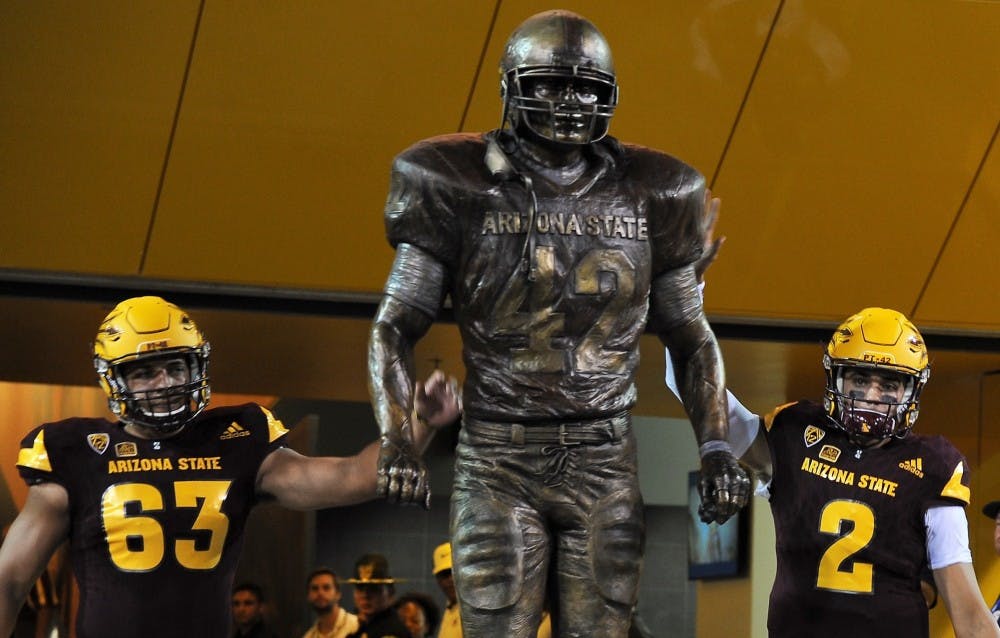Transitioning from the military to civilian life can represent a big obstacle for veterans, often making it difficult to find employment after returning from service.
That is why in early April, ASU’s Pat Tillman Veterans Center and Deloitte held workshops in the Sun Devil Stadium to assist veterans in discovering marketable skills they already have and what job may best suit them.
“They have trouble finding the right kind of work,” said ASU Director of Veteran Services Steven Borden said. “(They're) actually qualified to do better things than sometimes what they start off doing when they first get out of the military. This kind of training is extremely helpful.”
Deloitte, a management consulting company, began the Career Opportunity Redefinition and Exploration (CORE) Leadership Program in 2015 through Deloitte University, the company's campus for educational and leadership development.
The program often travels to other cities and universities to offer mobile workshops.
ASU’s large veteran presence and military bases located in the Valley, made the University a good candidate, said Heath Clayton, veterans transition leader at Deloitte.
“Top of mind for us was the veteran unemployment rate when we created the program, but also their retention rate,” Clayton said. “We found that veterans were not staying in their jobs as long as non-veterans.”
The course focuses on four main points: identifying veterans' strengths and passions, finding career opportunities aligned with those passions, utilizing the power of networking and telling their stories.
Since the program's beginning, Deloitte has educated 1,500 veterans through the workshop and 96% of them have jobs, Clayton said.
He said the program is a “philanthropic initiative of Deloitte.”
The purpose of the workshops is not specifically to recruit veterans to work with Deloitte, he said, but to focus on where they will thrive. But if Deloitte is a good fit for veterans, they may land a job there, he said.
Brian Copeland, a 12-year Marine veteran and an ASU senior majoring in business administration and marketing professional sales, said he attended the workshop after hearing about it through an email.
After returning from the Marines and being in college for the past 3 1/2 years, Copeland said he experienced many transitions and still had questions about the career path he wants to pursue.
It can be difficult to interview as a veteran, because interviews often focus on oneself's achievements while military trains soldiers to think as a team, Copeland said.
"In the military, we're always focused on the mission, our troops, and other things in ourselves as people,” Copeland said. “That was the main key that (Deloitte) really stated at the beginning was they're here to help us focus on ourselves, how to advertise and brand ourselves and just present ourselves in a better manner to companies and the corporate world.”
There are 18.6 million veterans living in the U.S., according to a 2017 report by the U.S. Department of Veteran Affairs. In March 2018, 4.1% of all veterans were unemployed, which is comparable to the national unemployment rate during that year. But in 2019, that number fell to 2.9%, according to the U.S. Department of Labor.
ASU’s Pat Tillman Veterans Center extends many resources to help its veterans, with a veterans center at every campus. The center works with veterans and their family members through “their entire life cycle as a student.”
In terms of employment, Borden said the centers work to place veterans at jobs where they can connect with each other and utilize their skills.
Clayton and Borden said they hope to have another workshop at ASU in the future.
“If veterans are stuck in a hole and still trying to figure things out, it can give you a little bit more perspective and you can gain a lot from it,” Copeland said.
Reach the reporter at nschon@asu.edu and follow @schonn2 on Twitter.
Like The State Press on Facebook and follow @statepress on Twitter.




